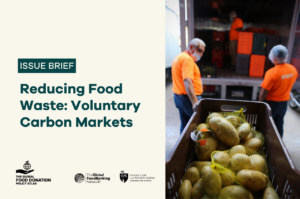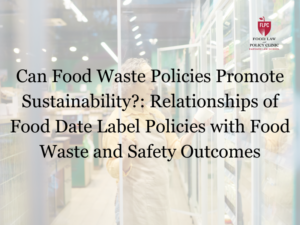[Boston, MA – March 26, 2025] — A new issue brief from the Harvard Law School Food Law and Policy Clinic (FLPC) and The Global FoodBanking Network emphasizes the urgent need for robust policy frameworks to enhance the integrity and effectiveness of voluntary carbon markets (VCMs) in supporting food recovery organizations combating hunger and climate change. It is the latest policy area of study in The Global Food Donation Policy Atlas.
Food loss and waste (FLW) is one of the most pressing challenges in our food system. Roughly one-third of all food produced worldwide—approximately 1.3 billion tons—is lost or wasted annually, with significant social, environmental, and economic costs. Most FLW ends up in landfills, where it emits methane, a powerful greenhouse gas.
At the same time, hunger and food insecurity persist. In 2023, one in every eleven people experienced hunger and 2.3 billion people—29% of the global population—experienced moderate or severe food insecurity. This is an increase of 350 million people compared to pre-pandemic levels.
The brief, Reducing Food Waste: Voluntary Carbon Markets, acknowledges the existing operation of VCMs, where entities voluntarily purchase carbon credits to offset their emissions. Some food recovery organizations, like Red BAMX (Red de Bancos de Alimentos de México, the Network of Mexican Food Banks), are already participating in these markets, demonstrating the potential for this innovative financing mechanism. The sale of carbon credits—earned by diverting food from landfills and reducing methane emissions—could be used to support the efforts of food recovery organizations and allow for them to scale up their important work.
However, the brief argues that without stronger governmental oversight and standardized practices, the impact and credibility of these markets are at risk.
Voluntary carbon markets offer a promising avenue for food recovery organizations to secure sustainable funding while mitigating the devastating effects of food loss and waste. But to ensure these markets truly deliver on their potential, governments must step up to provide the necessary guardrails.
The brief, developed with funding from the Lineage Foundation for Good to support the Global Food Donation Policy Atlas, proposes leveraging revenue from carbon credit sales to support food recovery organizations, but stresses the importance of integrity and transparency.
Key Policy Recommendations:
- Regulate the Voluntary Carbon Market: Governments should implement clear regulations to establish standards, ensure accountability, and enhance the credibility of VCMs.
- Endorse Credible Carbon Market Standards: In lieu of direct regulation, governments should endorse and promote adherence to established, reputable carbon market standards.
- Provide Financial Support for Market Entry: Governments should offer grants and other financial assistance to alleviate the financial and administrative burdens faced by food recovery organizations seeking to participate in VCMs.
“Food recovery and redistribution is a proven strategy that can both mitigate climate change– by reducing food in landfills that is a major global source of methane emissions–and can improve food insecurity by ensuring safe, edible food makes it to those in need,” said Emily Broad Leib, faculty director of the FLPC. “To scale this work, food recovery organizations need reliable funding and voluntary carbon markets could provide much-needed, sustainable revenue streams. This issue brief is a call to action for policy makers to recognize the critical role they play in shaping the future of voluntary carbon markets. By implementing sound policies, governments can ensure that these markets drive real, measurable impact in addressing both food insecurity and climate change.”
The brief underscores the economic and environmental benefits of reducing food loss and waste, but emphasizes that without proper policy frameworks, the potential of VCMs to support these efforts will be undermined.
“Through our FRAME [Food Recovery to Avoid Methane Emissions] methodology, we are helping food banks precisely measure their emissions mitigation from food recovery and we know this robust data could make food banks eligible for new financing streams through voluntary carbon markets,” said Lisa Moon, president and CEO of The Global FoodBanking Network. “Research like this is critical for food banking organizations to understand the opportunities and risks that exist in pursuing VCMs.”
Additional discussion of these recommendations can be found in the Issue Brief, supported by the Lineage Foundation for Good and part of The Global Food Donation Policy Atlas co-produced by the Harvard Law School Food Law and Policy Clinic and The Global Foodbanking Network. The Atlas promotes strong food donation policies as global solutions to hunger and food loss and waste, analyzes and compares national laws and policies on food loss and waste, and offers tailored recommendations to clarify and optimize food waste reduction.
Media Contact:
Adaobi Ezeokoli
aezeokoli@law.harvard.edu
James Fredrick
###
The Harvard Law School Food Law and Policy Clinic
Since 2010, the Harvard Law School Food Law and Policy Clinic (FLPC) has served partner organizations and communities by providing guidance on cutting-edge food system issues while engaging and educating law students in the practice of food law and policy. FLPC is committed to advancing a cross-sector, multidisciplinary, and inclusive approach to its work, building partnerships with academic institutions, government agencies, nonprofit organizations, private-sector actors, and civil society with expertise in public health, the environment, and the economy. FLPC’s work focuses on increasing access to healthy foods, supporting sustainable production and regional food systems, promoting community-led food system change, and reducing waste of healthy, wholesome food.
The Global FoodBanking Network
Food banking offers a solution to both chronic hunger and the climate crisis. GFN works with partners in more than 50 countries to redirect surplus, healthy food to those who need it. In 2023, our network provided food to more than 40 million people, reducing food waste and creating healthy, resilient communities. We help the food system function as it should: nourishing people and the planet together. Learn more at foodbanking.org.
Lineage Foundation for Good
The Lineage Foundation for Good (the “Foundation”) is the independent philanthropic arm of Lineage, Inc. (“Lineage”). The Foundation leverages the unique access, influence, experience and expertise of Lineage, one of the world’s largest temperature-controlled logistics solutions providers, and its customers and partners to reduce food waste and fight food insecurity – a need that was accelerated by the practical challenges of getting quality food to those in need during the COVID-19 pandemic. Central to the Foundation’s mission is to develop a dynamic, real-time and global link between those who commercially produce our food and the individuals, families and communities who need it most. The Foundation creates a system in which food products, including those that might have otherwise gone to waste, can be quickly and easily steered to food pantries and other non-profits combatting food insecurity around the world. The Foundation supports various philanthropic initiatives that have an impact in the communities in which we live and work, and is proud to partner with Feeding America, the Global FoodBanking Network, and other organizations to expand its reach, maximize its impact and help feed the world.


Health Law & Policy, Commentary
Freezing the Freeze: An Update on Litigation Challenging Trump’s Funding Freeze – HCIM
March 27, 2025